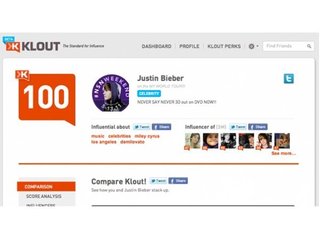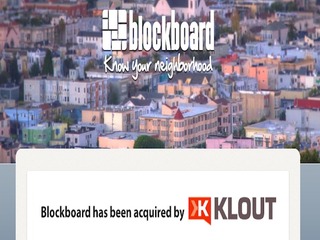DUOS expands AI capabilities to help seniors apply for assistance programs
It will complete and submit forms, and integrate with state benefit systems
Read more...

One UK-based social influence marketing platform, looking to knock Klout off its pedestal, just picked up a $3 million round of funding. PeerIndex landed this Series-A round of funding led by Antrak Capital with participation from the ex-head of Reuters, Tom Glocer.
PeerIndex, much like Klout, claims to measure just how influential people are online by using algorithms to see how may people read and re-tweet their Twitter activity or respond to Facebook status updates or connect with them on Foursquare and other services. But consumers around the globe have been critical of just how these influence rates are calculated and whether influence is certain categories is weighed more heavily than others.
Also like Klout, PeerIndex uses its algorithms to connect brands with the social media mavins that are most influential in overlapping topics -- i.e. connecting Volvo with people that are influential in luxuries purchases, cars, racing, driving or other topics. PeerIndex has partnered with companies such as Atlantic Records and Penguin Books in the past for different campaigns that offer PeerIndex users perks for being so influential in particular topics.
PeerIndex says that the funding will go toward expanding the B2B business as well as its consumer PeerPerks.
London-based PeerIndex bases its scores on a 1 to 100 index and is working to compete with the much more established San Francisco-based Klout which recently raised $30 million for its scoring, API and campaign partnerships.
Back in October, Klout changed some of the algorithms it used to measure influence, and many users were bumped down several points -- and boy did some of them get our about it. For some marketing and PR teams, your Klout score is a point of pride (even something on your resume). But Klout insisted that it will continue to tinker with the algorithm to gain "more accurate" measurements of influence just as the social media world evolves.
If PeerIndex grows in its campaign partnerships, like Klout has, growing valuation and acquisitions could be in its future. Just last month, Klout showed its evolving nature and acquired a neighborhood interaction application called Blockboard.
The terms of the acquisition were not publicly disclosed but it does appear to be a way to boost the company's ability to get more localized information and sharing since Blockboard's focus is on the neighborhood level.
The Blockboard app allows people in a given neighborhood to share information about crime, events, asks questions and report issues such as potholes and graffiti directly to city officials.
Blockboard raised a $1 million in seed funding in 2010 from Schachter, Mitch Kapor, the Founder Collective, Battery Ventures, Harrison Metal, Josh Stylman, Tom McInerney, and David Liu and was created by founders: Dave Baggeroer, Stephen Hood and Josh Whiting.
In a blog post, Klout founder and CEO Joe Fernandez explained that the Blockboard technology will be pivotal to help mobilize and localize the content for the service -- especially since the company has yet to come out with a mobile application.
"To keep driving toward our mission of unlocking every user’s influence, we need to make Klout useful and accessible wherever they are – whether they’re at home or on the go," Fernandez wrote. "Blockboard has built an amazing local-mobile app that connects neighbors to build stronger communities through technology."
Unlike some Twitter acquisitions, Klout said that Blockboard’s app would continue to be available.
It is not out of the realm of possibilities that PeerIndex will also find a strength in specializing in hyperlocal coverage and specialities, that companies will want to use data collected for possible marketing or out-reach opportunities.
How PeerIndex scores calculated
The PeerIndex algorithm looks at the importance of speed and quantity of sharing. So PeerIndex factors in the quality of knowledge, or authority, in a specific subject area by weighing the number of times your content is: retweeted, Facebook-shared, +1'ed or commented on, by someone else that is an authority on the subject.
Sudden bursts of activity or inactivity don't help or hurt one's PeerIndex scores in a particular topic that rapidly. So consistent coverage of a topic then, say, a two week vacation, does little to change your influence.
Scores are updated several times a week, but if your activity remains the same then your score may not change at all after such re-calculations.
In order to gain a full picture of your social influence, according to PeerIndex, you should connect PeerIndex with all of you major social media accounts, such as Google+, Facebook, Twitter and LinkedIn.


Personally, I am a little flummoxed by the way the PeerIndex is calculated since its ranks me at a score of 11, while Klout has me at a solid 52. That is a serious discrepancy, especially since they both weigh on a 1 to 100 scale. But some of this may be because Klout has had more time to watch my social media activity, I'll see how my PeerIndex score acts over several weeks or if the score will knock my bravado down a few pegs.
It will complete and submit forms, and integrate with state benefit systems
Read more...The bill would require a report on how these industries use AI to valuate homes and underwrite loans
Read more...The artists wrote an open letter accusing OpenAI of misleading and using them
Read more...




